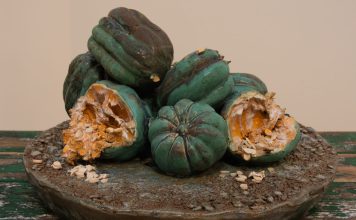South Valley region sprouts cluster of seed companies
Dennis Taylor
Business Editor
dt*****@**********rs.com
For the past century, the South Valley seed industry has moseyed along at the pace of, well, spring blooms. But advancements in technology as well as global economic pressures are dramatically reshaping the trade.
The increasing role of major retail chains such as Home Depot, Lowe’s and Wal-Mart on seed manufacturers, the continued consolidation of the competitive landscape and rapid advances in genetics are keeping local seed developers fleet of foot. Meanwhile, consumers and farmers are the ones truly coming out ahead when they purchase a flat of geraniums, the latest broccoli seeds or give a squeeze to those ripe tomatoes in the produce aisle.
Most of the benefits consumers enjoy today are crafted behind the scenes along various points of the seed industry’s distribution chain.
“We can no longer just rely on our plant breeding,” said Joel Goldsmith, president of Gilroy-based Goldsmith Seeds Inc., one of the largest wholesale breeders of hybrid flower seeds in the world. “We need to provide support to our brokers, our growers and, increasingly, the retailers. Our involvement reaches much further down the distribution chain.”
On the vegetable side, the demand for taste and nutrition is driving much of Morgan Hill-based Sakata Seed USA’s breeding efforts, said John Nelson, director of sales and marketing for Sakata USA.
“Taste and nutrition is really becoming a factor in the U.S.,” Nelson said. “Of course the demand from the farmer is yield, yield and yield – in that order.”
Retailers making presence felt
For the past 100 years, ever since Linwood Wheeler moved west to Gilroy from Chicago to start a lettuce seed company with John W. Pieters, the industry has worked pretty much the same way. Seed brokers would come to the seed developers’ annual trials, choose the seeds they believed the growers they represented wanted and place orders. Eventually the growers themselves began to attend the trials, making sure that factors beyond the appearance of the particular flower or vegetable were addressed.
Will all the seeds produce uniform-sized flowers – critical to growers who depend on producing large volumes of plants in as little space as possible? Do the seeds have good shelf lives so growers can increase or decrease plantings as demand dictates? Do the seeds have adequate germination rates approaching 100 percent so growers maximize their production? And has the breeding process maximized the growth rate of flowers so fewer chemicals – called plant-growth regulators – are needed, which would contribute to “greener” processes as well as reducing overhead costs?
Those were the questions concerning Glenn and Jane Goldsmith when they founded the company in 1962. Their son, Joel Goldsmith, has far more concerns as he and two of his brothers direct the future of the company.
Today representatives of retail conglomerates such as Wal-Mart, Home Depot and Lowe’s attend the trials with interests that often differ from the growers. Retailers are concerned about heartiness of the plants, enabling them to display flowers for longer periods of time with minimal maintenance while still looking attractive to the consumer.
Goldsmith, recognizing the growing influence of retailers, has added a “retail specialist” to its team of broker and grower representatives.
Another trend driving retail demand in the vegetable seed market is the increasing ethnic diversity, particularly in California, and the accompanying demand for ethnic foods.
“Ethnic diversity is blossoming and the desire for ethnic foods is growing,” Sakata Seed’s Nelson said. “The world’s becoming smaller, requiring the transfer of products from region to region.”
Why the South Valley?
Following a degree in genetics at University of California, Davis, and further studies at the University of California, Los Angeles, founder Glenn Goldsmith pursued a career in seed production with several companies before he and his wife, Jane, launched Goldsmith Seeds in Gilroy in 1962. The climate, when not facing drought years, provides ample warm weather, good soil chemistry and an existing agriculture support infrastructure – fertilizer and pesticide suppliers, transportation and expertise from U.C. Extensions and county Farm Bureaus.
Similar attributes that lured Sakata Seeds America to Morgan Hill.
“The valley is close to transportation hubs – San Francisco for air export and the Port of Oakland for shipping – and as a net exporter of seed, transportation is an important factor,” Nelson said of Sakata’s decision to make Morgan Hill the North American headquarters of the company.
Gilroy, Morgan Hill, and the Hollister and San Juan valleys have been historic prime growing regions, and with the Salinas Valley 20 minutes south, seed breeders have a literal salad bowl of options. Sakata is the No. 1 broccoli seed company in the world and a developer of brocollini, an increasingly popular hybrid of brocolli and Chinese Kale, and the South Valley and the Salinas Valley are major brocolli growing regions, Nelson said. Sakata maintains a 40-acre research-and-development farm in the Salinas area.
More seeds, fewer companies
Seemingly everywhere you turn the seed industry is consolidating, and several local companies are in the middle of it. Fischer, a privately held German company that sells flower cuttings germinated from Goldsmith Seeds’ products (sold under the marketing name of Goldfisch) was recently acquired for $67 million by agricultural chemical maker and seed breeder Syngenta AG, also a German company.
And just to make it a cozy community, Syngenta, with 2006 global sales of $8.05 billion, also operates a seed processing facility in Gilroy – which makes Syngenta and Goldsmith kissing cousins as well as neighbors.
Vegetable seed maker Seminis Inc., which has a research-and-development operation on Lucy Brown Road in San Juan Bautista, is a global leader in seeds for commercial fruit and vegetable growers and supplies more than 3,500 seed varieties to more than 150 countries. In 2005 the company was acquired by the multinational seed, chemical and equipment maker Monsanto Inc., which posted sales for the three months ended Feb. 28 of more than $2.6 billion.
And in 2005, Sakata Seeds USA acquired Calusa-based Qualiveg and its subsidiaries. Sakata Seeds USA is a subsidiary of Yokohama, Japan-based Sakata Seeds Corp, with 2006 sales of nearly $380 million. The Morgan Hill headquarters oversees operations in Canada, the U.S., Mexico and Central America, as well as its research farm in Salinas.
“The pressure on a small company for resources to compete in the global marketplace is enormous,” Nelson said. “Research and development costs require a lot of capital, and if the capital is not there, the small companies will look to partner up.”
In some segments of the market, for better or worse, more of the world’s seed supply is being developed by fewer and fewer companies. The four largest corn-seed companies, for example, account for nearly 70 percent of all U.S. corn seed sale, according to 2004 studies by the U.S. Department of Agriculture, the most recent figures available. The four largest cotton-seed companies accounted for 90 percent of U.S. sales in 2004.
Global markets
But while consolidations might seem like the world is closing in on small seed developers, it is also opening up huge new markets and the ability to develop seeds in myriad climates and environments.
Goldsmith, for example, has the lion’s share of its production in Guatemala, with additional acreage in Kenya, Africa. Guatemala, in addition to having lower labor costs for the 2,000 people Goldsmith employs there, provides a year-round growing climate. Worldwide, Goldsmith employs 4,000 people on three continents.
“[Guatamala’s]constant, year-round temperatures, reduce the cost of providing heaters in greenhouses,” Goldsmith said.
Goldsmith has production acreage in several locations, dictated by altitude – nature’s temperature control.
The relationship between Goldsmith and Guatemala can serve as a model for other seed growers. In both Guatemala and Kenya, the company maintains health-care clinics for employees and their families. In 1997 the Guatemalan government presented family patriarch Glenn Goldsmith with the Guatemala Peace Medallion for retaining seed production farms there despite the longest civil war in Central American history.
Meanwhile, Sakata operates facilities on every continent on the planet, with the exception of Australia.
The global marketplace can be a double-edged sword: As seen in the technology industry and the outsourcing of jobs to aspiring economies such as India, Asian nations can be major competitors. But they can also be major customers.
The two biggest markets for Seminis’ seeds are China and India, said spokeswoman Mica Veihman. And roughly three-quarters of the produce grown in the world is grown in Asia.
“The luxury today is seeing year-round produce in the supermarket,” Veihman said. “More vegetables are coming in from Chile, and we’re even seeing Indian mangos. China and India are exporting a lot, just like they are in the grand scale.”
All of which open large and lucrative markets for home-grown seed companies.
Frankenstein plants?
Despite highly publicized outcry over so-called genetically modified food, seed producers today are attempting to stay out of that fray. Joel Goldsmith is adamant about being a seed “breeder,” taking cuttings from one plant with desired traits and cross-breeding it with another – the same way growers have been developing hybrids for centuries.
At Seminis’ San Juan Bautista R&D operation, genetics are used, but not for genetic modified produce that its parent Monsanto has perfected with soybeans and corn.
Veihman explained that Seminis uses genetic “markers” to identify desirable traits in vegetable plants, most notably higher yields for farmers and better taste for consumers.
“We used to look at the characteristics we wanted – growing tall, high yields, superior taste – but that would take a long time,” Veihman said. “Today we can go in and look at the DNA blueprint of that plant and identify the gene that correlates to that color, taste and nutrition level.”
Dennis Taylor is the Business Editor for South Valley Newspapers. Reach him at (408) 847-7097 or at dt*****@**********rs.com.














